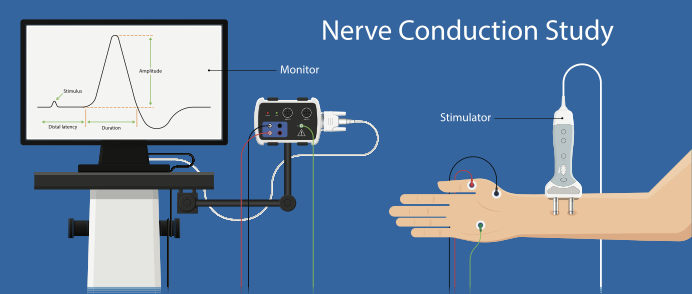Electromyography[EMG] / Nerve Conduction Study[NCS]
This is diagnostic test that measures how the muscles and nerves work. It’s usually done to an arm or leg.

An EMG nerve test can provide your doctor with specific information about the extent of nerve and/or muscle injury and can also determine the exact location of injury and give some indication whether the damage is reversible.
There are actually two parts to EMG:
- Nerve conduction study – The nerves are stimulated at different points with small electric shocks, artificially activating them so their function can be measured.
- Needle exam for muscle testing – Very fine needles are inserted into several muscles. Each needle has a microscopic electrode that picks up both the normal and abnormal electrical signals given off by a muscle.
What is an EMG test used to diagnose?
Conditions that EMG testing helps diagnose include:
- carpal tunnel syndrome
- pinched nerve
- radiculopathy
- sciatica
- neuropathies
- muscle diseases
- muscular dystrophy
- myasthenia gravis
Why does my doctor want me to have an EMG test?
Your doctor may order an EMG test if you experience any of the following symptoms:
- numbness
- decreased sensation
- tingling or frequent feeling of “pins and needles”
- radiating pain or burning sensation
- muscle spasms or weakness
- difficulty performing daily tasks such as walking, buttoning clothes or handling objects
How long does an EMG test take?
EMG testing usually takes anywhere from 30 to 90 minutes, depending on the condition being tested and findings of the study. A report that includes the results and an interpretation will be sent to your doctor.
Is an EMG test painful?
EMG testing may result in some discomfort, but it is usually well tolerated without any need for pain medication.
What you should know before an EMG test?
EMG testing is extremely safe, but talk with your doctor if you take blood thinners, have a pacemaker or implanted defibrillator before having the test. No special preparation is needed for people who have a hip, knee or other joint replacement prosthesis.
- If you are taking anticoagulation medications (blood thinners) or have a pacemaker or implanted defibrillator, you should notify their doctor before having the test. In general, these conditions will not create any complications and you can have an EMG test safely.
- Unlike preparing for dental procedures or certain types of surgeries by taking antibiotics, no special preparation is necessary in those patients who have a joint replacement or other artificial implant in their body.
- You should take any medications your normally take on the day of the test.
- An EMG test is very safe. EMG needles are used for only one patient, are not recycled, and are immediately disposed of following use.
Before you have a medical test, make sure you ask your doctor why you need it. Ask him or her to explain all the potential benefits and risks. Together, you can make the best choice for you and your health.


